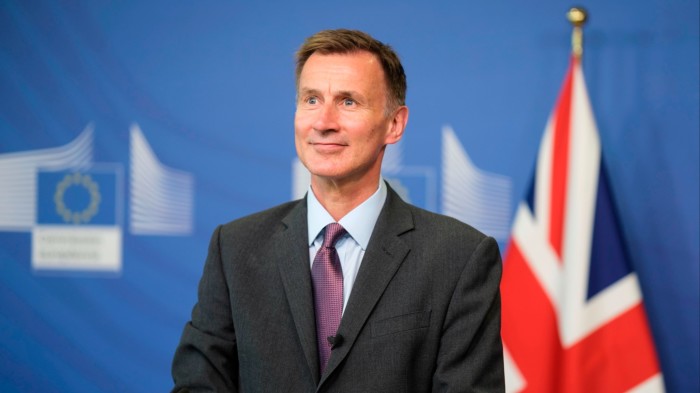Unlock the Editor’s Digest for free
Roula Khalaf, Editor of the FT, selects her favourite stories in this weekly newsletter.
Britain’s foreign secretary has the grandest office in Whitehall, far grander than the prime minister’s across the road in Downing Street, as Jeremy Hunt notes. It was designed to impress foreign dignitaries. Insiders are less prone to awe. As one permanent secretary, housed in the vast room directly below, said to me as he pointed to a crack in his ceiling: “It would be quite wrong to assume that is from the foreign secretary stamping his foot.”
What do you do with the role, though, never mind the room? Number 10 will always deal with the US, Europe and wars; the chancellor will always make a bid, as Rachel Reeves has done, to deal with China. If the foreign secretary is not careful to find a theme to pursue, he or she will be left with the Commonwealth, mid-tier relationships and boosterism (as in the Britain is “GREAT” posters that adorn the UK’s embassies and consulates).
“My definition of a great country is one that is capable of shaping the world, and not just being shaped by it,” writes Hunt in Can We Be Great Again?. To test this, he works briskly through a list of global problems — security, climate change, disease, migration, and so on — and evaluates how the UK might influence the outcomes. Sometimes he seems blithe, as in his conclusion that “in every case the UK remains one of the top ten most influential countries on the planet”.
Hunt has an advantage in writing this book. As well as having served as foreign secretary, he was chancellor in the last two Tory governments. That perspective brings the hard edge of money up against any temptation to exaggerate British influence. It also adds real urgency, in that the UK’s need for growth and security through foreign policy is clear.
The resounding answer Hunt gives to his own question comes right at the end but is surely the right one: yes, but only if the UK gets its economy growing strongly again. If not, “irrelevance and possible bankruptcy await”.
Before he arrives there, Hunt presents scores of tips for how government could make the most of the UK’s strengths. His best points are on security and defence, where the UK has found a way to work closely with the US and Europe. He is also good on the “middle power” relationships that the UK has reinforced since Brexit, including with India, Japan and the Gulf. And he is eloquent on the point where Keir Starmer’s Labour government talks the talk but seems equivocal on commitment: the importance of developing the UK’s science, tech and medical strengths into a powerful source of growth.

There are sensible if routine points such as not stripping the BBC World Service of funding (advice that went unheeded this week). But he can appear glib in recounting past successes, from military intervention in Sierra Leone and vaccine development to AI giant DeepMind. Undeniable, yes. The problem is that they are not reproduced enough.
Sadly Hunt dodges some of the bigger questions for UK policy — notably China. Recalling past struggles between democracy and autocracy, he observes that “whereas in the last century the outcome depended on military might, this time it is more likely to be decided by economic might”.
Yet that does not give a guide to the decisions awaiting Starmer. For example, Beijing really wants its new embassy in the UK to be housed in the old Royal Mint building. Among those alarmed at the prospect is the White House, which wants the UK to reject this because the vast communications cables running under the site near the Tower of London carry the City’s data. The possible security risks associated with buying Chinese wind farm technology is another difficult decision facing Number 10.
Hunt could have been tougher about the tangle the government is making of the key triangle of relationships the UK has with the US, Europe and China. For all that Starmer vows a close relationship with each, contradictions loom between chasing the benefits of more trade versus Beijing’s support for Russia over Ukraine, and over issues such as digital content control, taxes and regulation.
The portrait he sketches is accurately one of a country unnecessarily diffident about the influence it has while wishing it had the attributes to procure more. All routes, as Hunt rightly says, lead back to the UK’s financial position: whether the government can unlock growth while persuading voters not to demand more than the country can afford and not to throw out political leaders who deliver that tough message.
Can We Be Great Again? Why a Dangerous World Needs Britain by Jeremy Hunt Swift £25, 304 pages
Bronwen Maddox is the director of Chatham House
Join our online book group on Facebook at FT Books Café and follow FT Weekend on Instagram, Bluesky and X




